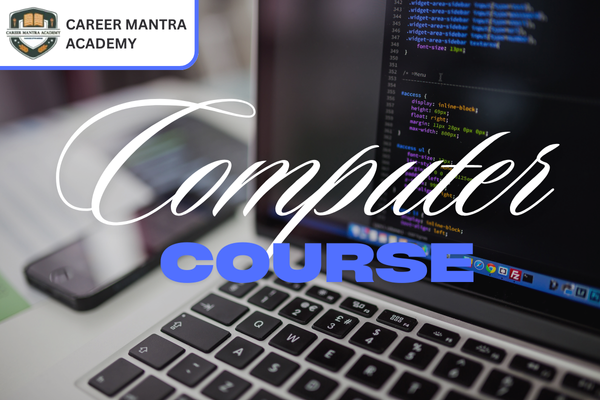What Are Computer Courses in Today’s Digital World?
Computer Course Benefits are very useful in today’s digital world because they teach people the technical skills they need to do well in modern jobs. These classes teach you everything from basic computer skills to advanced programming, which makes you more employable, productive, and able to solve problems. Also, they encourage good communication, data management, and digital creativity, which are all important in every field. Also, being able to use computers helps professionals, students, and entrepreneurs keep up with new technologies like cloud computing, artificial intelligence, and cybersecurity. Computer courses are important to keep up with in a society that is becoming more digital.
- Boost Career Opportunities
Computer courses open multiple career paths in IT, finance, education, healthcare, and business by providing skills that are always in demand in the job market.
- Improve Digital Literacy
They help individuals master basic to advanced digital tools, enabling smooth navigation of technology-driven tasks in workplaces, education, and daily life.
- Increase Productivity & Efficiency
Knowledge of software like MS Office, Excel, and specialised tools improves work speed, accuracy, and overall efficiency in professional and personal tasks.
- Support Entrepreneurship & Freelancing
Computer skills enable entrepreneurs to run online businesses, create digital marketing strategies, manage e-commerce, and freelancers to offer global services.
- Adapt to Emerging Technologies
Courses in AI, cybersecurity, cloud computing, and data science help learners keep pace with rapidly evolving digital innovations.

For Applying Computer Course Click Here
Why Should Students Learn Computer Skills?
Students should learn how to use computers because they are important for school, work, and everyday life. Computer literacy helps with learning, research, creativity, and communication because technology is a part of every field. These skills get students ready for jobs in the future, help them be more productive, and make them competitive on a global scale. Students who know how to use computers can adapt, come up with new ideas, and do well in the fast-changing digital world, from basic applications to advanced technologies.
Key Reasons Why Students Should Learn Computer Skills:
- Enhance Academic Performance
Computers help students research, create assignments, and access e-learning tools that improve their study efficiency.
- Build Career Readiness
Computer skills are vital in almost every profession, giving students better job opportunities.
- Improve Creativity & Innovation
Digital tools allow students to design, code, and explore new ideas effectively.
- Strengthen Communication Skills
Email, video conferencing, and online collaboration tools improve student interaction and teamwork.
- Stay Future-Ready
Early exposure to technology helps students adapt to new digital trends with confidence.
Basic Computer Knowledge
What are the benefits of a computer course?
Computer Course Benefits. In today’s digital age, taking computer classes is very helpful. Not only do they help you learn technical skills, but they also help you get better jobs, be more creative, and be more flexible. Learning how to use computers can help anyone, from students to people who work, because these skills make them more productive, better at communicating, and ready for the future. Here are some of the main benefits of taking computer classes:
- Better Career Opportunities
Computer courses open a wide range of career paths across industries like IT, finance, healthcare, business, and education. Employers prefer candidates with strong computer knowledge, as these skills are essential in almost every role. With certifications or specialised training, learners can secure higher-paying jobs, promotions, or even explore international opportunities in today’s competitive job market.
- Boosts Productivity
Learning computer tools like MS Office, Excel, PowerPoint, or advanced software helps students and professionals complete tasks quickly and accurately. From preparing reports to analysing data, computer courses improve efficiency in both academic and workplace settings. Increased productivity not only saves time but also builds confidence, allowing individuals to manage responsibilities effectively in a digital environment.
- Enhances Digital Literacy
In today’s world, digital literacy is a necessity. Computer courses teach the basics of internet usage, online safety, and essential applications, making people confident in handling everyday digital tasks. Whether browsing for information, creating documents, or managing online accounts, digital literacy enables smooth communication and helps individuals adapt easily to technology-driven environments in personal and professional life.
- Supports Creativity & Innovation
Computer courses provide exposure to creative tools such as graphic design software, coding platforms, and video editing applications. These resources encourage students and professionals to think innovatively and create unique projects. By blending technology with creativity, learners can design websites, edit videos, or build apps, helping them stand out in academic, freelance, or entrepreneurial pursuits.
- Prepares for Future Trends
Technology evolves rapidly, with fields like artificial intelligence, cybersecurity, data science, and cloud computing shaping the future. Computer courses prepare learners to understand and adapt to these emerging trends. By upgrading their skills, individuals remain relevant in the job market, stay future-ready, and maintain a competitive advantage in industries that are increasingly driven by technology.
How Do Computer Course Benefits Improve Career Opportunities?
Taking a Computer course can greatly improve your job prospects by giving you the digital skills that employers want. Almost every job these days needs computer skills, whether it’s in IT, finance, healthcare, business, or education. These classes teach people how to use software, manage data, communicate digitally, and learn about new technologies. This makes them more competitive and likely to get a job. Getting certified in computer skills also makes your resume look better, gives you a better chance of getting a promotion, and opens up opportunities for freelancing or starting your own business.

What Computer Course Benefits Help in Personal Growth and Confidence?
In addition to helping you advance professionally, computer classes also help you develop personally and boost your self-esteem. People who learn computer skills can do things like communicate online, bank, shop, and find information on their own. These classes help you become better at solving problems, being creative, and being flexible, which all make you a better person. Digital literacy also makes people less afraid of technology and more confident and curious about learning more. Also, knowing how to use software tools, give presentations, or even code well lets people show off their skills. So, knowing how to use a computer helps you grow as a person and feel more confident in today’s tech-driven world.
Which Computer Course Benefits Are Most Useful for Working Professionals?
These are the benefits of using computer courses use professionals:
| Computer Course Benefits | How It Helps Working Professionals |
| Enhanced Productivity | Knowledge of tools like MS Office, Excel, and project management software helps professionals complete tasks faster, manage data effectively, and improve overall efficiency at work. |
| Better Career Growth | Computer courses add value to resumes, increase promotion chances, and open new career opportunities across IT, business, finance, and management sectors. |
| Improved Communication | Skills in email, presentations, and online collaboration tools make communication smoother, leading to better teamwork and professional relationships. |
| Adaptability to Technology | Continuous learning in areas like AI, cloud computing, and cybersecurity keeps professionals updated with industry trends and relevant in the job market. |
| Work Flexibility & Freelancing | Computer skills allow professionals to explore freelancing, remote jobs, and entrepreneurial opportunities, giving them more career flexibility and independence. |
How Do Computer Course Benefits Support Business and Entrepreneurship?
Computer Course Benefits: By giving students the digital skills they need to successfully manage and expand their businesses, computer courses have a significant positive impact on business and entrepreneurship. They support innovation, communication, marketing, and management. Important points consist of:
- Efficient Business Management – Skills in Excel, accounting software, and management tools help track finances and operations smoothly.
- Digital Marketing Advantage – Knowledge of SEO, social media, and ads enables entrepreneurs to reach wider audiences cost-effectively.
- Better Communication – Tools like email, video calls, and collaboration platforms ensure smooth client and team interactions.
- Innovation & Creativity – Courses in design, coding, or multimedia allow entrepreneurs to create unique products and services.
- Global Opportunities – Computer literacy supports e-commerce, freelancing, and online platforms to expand business internationally.
Can Computer Course Benefits Help in Freelancing and Remote Jobs?
Yes, computer course benefits can be very helpful for freelancing and remote jobs because they teach you the digital skills you need to work alone and online. Computer classes teach a lot of the skills that freelancers need, like graphic design, content writing, digital marketing, programming, and data analysis. These skills not only open up more job opportunities, but they also let people connect with clients all over the world through the internet. Knowing how to use a computer makes it even easier to talk to people, manage your time, and finish projects when you work from home.
What Are the Long-Term Computer Course Benefits for Your Future?
Computer Course Benefits: Long-term computer classes are important for the future because they help people keep their jobs, learn new things, and adapt to new situations. People who are good with computers stay ahead in their fields because technology changes so quickly. You will always find these skills useful: how to use technology, how to solve problems, and how to come up with new ideas. People can start their own businesses with their help. This gives them more chances to make money and opens up doors all over the world. In a digital world that is always changing, being able to use a computer helps people keep their jobs and feel good about themselves.
Conclusion.
One of the best things you can do in this digital age is to take computer classes. These workshops not only help you get a better job, but they also help you grow as a person, get more creative, and feel better about your own self-worth. Whether you are a student, a worker, or someone who wants to start their own business, knowing how to use a computer can help you adapt and plan for the future. Computer skills are now necessary in today’s world, where technology is used in every part of life. Taking computer classes is, therefore, a pretty smart investment in a safe, successful, and forward-looking future.
FAQs
What is computer full form?
A computer does not have an official full form because it is derived from the word “compute,” which means to calculate. However, in a normal learning format, many people use this popular expansion:
Computer = Common Operating Machine Purposely Used for Technological and Educational Research
This is not a scientific form, but it is widely taught for easy understanding.
What are the 3 important uses of computers?
The three main importance of computers are:
1. Education and Learning – Computers make studying easier with e-learning, online research, and digital tools that help students gain knowledge quickly.
2. Work and Business – They improve productivity, data management, communication, and decision-making in almost every industry.
3. Daily Life Convenience – From online banking and shopping to entertainment and social media, computers simplify everyday tasks and save time.
How is a computer useful in our daily lives?
A computer is very useful in our daily lives as it helps us in almost every activity. We use it for online communication, education, banking, shopping, and entertainment. Computers also make work easier by managing data, preparing documents, and supporting remote jobs. From booking tickets to learning new skills, computers save time, increase efficiency, and keep us connected in today’s digital world.
What are the 5 basic computer skills?
1. Typing and Keyboard Skills – Ability to type efficiently and use keyboard shortcuts for faster work.
2. File and Folder Management – Creating, saving, organising, and retrieving files on a computer.
3. Basic Software Usage – Using common programs like MS Word, Excel, and PowerPoint.
4. Internet and Email Skills – Browsing safely, searching for information, and communicating through email.
5. Basic Troubleshooting – Solving simple issues like restarting, installing software, or adjusting settings.
What are the major types of computers?
The major types of computers can be grouped based on their size, power, and purpose. Here are the main ones:
1. Supercomputers – Extremely powerful machines used for complex tasks like weather forecasting, space research, and scientific simulations.
2. Mainframe Computers – Large systems that handle vast amounts of data, often used by banks, government, and big organisations.
3. Minicomputers – Mid-sized computers, smaller than mainframes, used by medium-scale businesses for data processing.
4. Microcomputers (Personal Computers) – Commonly known as PCs or desktops, designed for individual use in homes, schools, and offices.
5. Laptops and Notebooks – Portable personal computers that combine mobility with functionality for students, professionals, and everyday use.
What is RAM?
ChatGPT said:
RAM stands for Random Access Memory. It is a type of computer memory that stores data and instructions temporarily while the computer is running. RAM is fast and allows the CPU to quickly access information needed to perform tasks. However, it is volatile memory, meaning all data is lost when the computer is turned off. The more RAM a system has, the faster it can handle multiple programs and processes at the same time.
What is a CPU?
The CPU stands for Central Processing Unit, and it is often called the brain of the computer. It controls and processes all instructions given to the computer, such as calculations, logic, and data management. The CPU works with memory and input/output devices to perform tasks. It mainly has three parts: the Arithmetic Logic Unit (ALU) for calculations, the Control Unit (CU) for managing operations, and registers for quick data storage. The speed and efficiency of a CPU determine how fast a computer performs.
